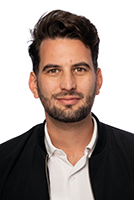This text is translated by UiOGPT.
– This is fantastic news and a major recognition, first and foremost for the two exceptionally skilled and creative project leaders, but also for their colleagues and research communities at the Department of Economics (ØI) and Department of Psychology (PSI), says Research Dean Lars Tjelta Westlye.

The Faculty of Social Sciences has for several years systematically worked to build expertise and experience in international financing and particularly the EU's frameworks, among other things through a significant commitment to strengthen the research administrative department.
– Although we primarily celebrate the project leaders and the opportunity for important scientific breakthroughs, such large international awards are the result of good teamwork between researchers and administrative staff, and there are many in the research administration at the units and faculty who also have reason to be proud of this achievement, says Westlye.
Value chains and value creation
Moxnes leads the project "The Division of Labor in Production Networks" (DIVISION), which will examine global value chains and what these chains mean to our economy.
– I am particularly interested in what it means for employees in companies that make use of value chains. Is it the case that some positions become redundant while others emerge? And what about wages - are there some workers who will benefit from it while others will lose out? asks Moxnes.
Childless men
The project "Health, Cognition, Family, and Employment among Men" (HOMME) is led by Vegard Skirbekk and is a collaboration between the Department of Psychology (PSI) and the Norwegian Institute of Public Health (NIPH).
Skirbekk will study the development of men's physical and mental health from their teens up to their sixties.
– One of the main goals of the project is to examine men without family and/or a stable job situation, and what separates those who manage to maintain good health and function throughout life from those who experience cognitive and functional decline, he says.
Building world-leading academic environments
Both projects are funded with approximately 26 million Norwegian kroner (2.5 million euros) over five years.
– I was thrilled and opened a bottle of bubbles with my girlfriend, Moxnes says about the news that ticked in a few days ago.
According to Moxnes, the funds will mainly go to hiring good researchers for the project.
– In this way, we can build a world-leading environment in international economics and global value chains, here in Oslo, he points out.
Skirbekk has similar plans for his project at the Department of Psychology (PSI).
– This is a significant recognition of our research, the studies we have conducted, the data we have collected, and the themes we are focusing on.
– The ambition is to become world-leading, he says..
Modern men
– We will probably have the world's most comprehensive dataset on cognitive development in adult men. Our approaches, research methods, enable an interdisciplinary understanding of what contributes to some men maintaining a high level of function and good health through life, Skirbekk further explains.
The project will particularly look at how changes in technology, culture, and economic conditions might affect men's opportunities and development. In addition, Skirbekk is interested in studying the effect that greater uncertainty in the labor market, as well as fewer men having children and forming families, may have.
– HOMME will provide a knowledge base to solve some of the biggest challenges of our time, outlines Skirbekk.
High level research
– We are greatly pleased with this award and look forward to following the projects, which both address important and current issues with great relevance for the society we live in, and which once again demonstrates that the research at the Faculty of Social Sciences keeps a high international level, concludes research dean Westlye.
Partner in ERC-project on crises

Yves Steinebach at the Department of Political Science (ISV) is a collaborating partner in the ERC project "Systemic Effects of Crises on Policy-Making in Modern Democracies" (CRISPOL) with project leader Christoph Knill at LMU Munich.
They will closely examine crises, particularly situations that arise in the wake of political decisions made in response to crisis events, as well as how crises affect governments' problem-solving capacity in sectors both closely and distantly related to the crisis itself.
"It may provide valuable knowledge on how the political-administrative apparatus must be organized to be able to handle multiple ongoing crises, while maintaining the state's governing function," elaborates Steinebach.
What is Advanced grant?
The European Research Council (ERC) supports groundbreaking research through attractive, long-term financing across all fields of study.
ERC Advanced Grant is aimed at established researchers with a "track record" showing that they are leading within their field.
Up to 2.5 million euros are granted for a maximum of five years.
